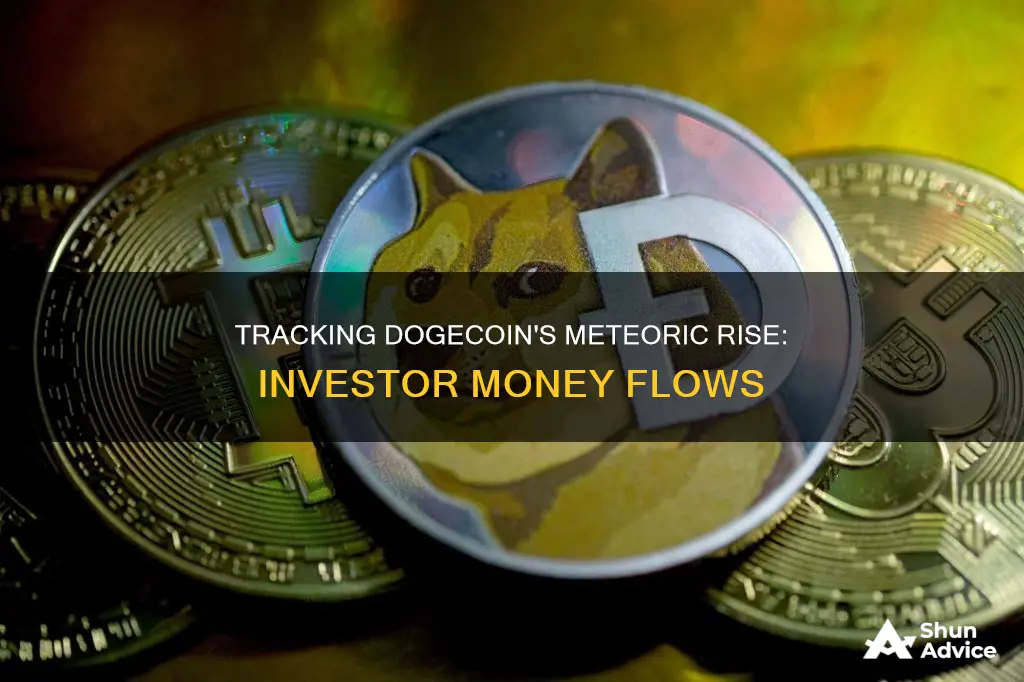
Dogecoin, the self-proclaimed joke cryptocurrency, has seen a surge in value since its creation in 2013. With its origins as a satirical take on Bitcoin, Dogecoin has since become one of the larger cryptocurrencies by market cap, with a total value that topped $80 billion in 2021.
The price of Dogecoin has increased by 37,000% in eight years, with a single DOGE token rising from $0.0004512 to $0.1676. This has led to speculation about how much money has been invested in Dogecoin, with some attributing its success to the support of high-profile figures such as Elon Musk, Snoop Dogg, and Mark Cuban.
Despite its popularity, Dogecoin is considered a risky investment due to its volatile nature and lack of decentralization. Critics argue that Dogecoin has no competitive edge, with high transaction fees that make it unattractive to merchants.
Nevertheless, Dogecoin's community-driven approach and lighthearted nature have fostered a supportive network, contributing to its success and making it an interesting topic for further discussion and analysis.
| Characteristics | Values |
|---|---|
| Current Market Cap | $12.25B |
| All-Time High | $0.74 |
| 24-Hour Trading Volume | $2.58B |
| Circulating Supply | 145 billion |
| Median Holding Time | 103 days |
What You'll Learn

Dogecoin's value and Elon Musk's influence
Dogecoin, a cryptocurrency created as a joke, has seen its value increase astronomically since its launch in 2013. The involvement of Elon Musk, who has been an outspoken supporter of the cryptocurrency, has been a significant factor in its rise to fame. Musk's tweets about Dogecoin have had a direct and immediate impact on its value, with prices often surging after his endorsements. For example, in April 2023, Musk changed the Twitter logo to an image of the Doge meme, causing Dogecoin prices to rise. This has sparked debates about the influence of high-profile individuals on the cryptocurrency market and whether it is healthy for the market to be so heavily influenced by a single individual.
Musk's first Dogecoin-related tweet was on December 20, 2020, when he tweeted, "One Word: Doge." Shortly after, the value of Dogecoin rose by 20%. Musk has continued to promote Dogecoin through his Twitter platform, frequently tweeting memes and making references to Dogecoin. These tweets have had a noticeable impact on the price of Dogecoin. For instance, in February 2021, Musk tweeted, "Dogecoin is the people's crypto" and "no highs, no lows, only Doge," causing the value of Dogecoin to rise by roughly 40%. On another occasion, Musk tweeted an image with a caption that referenced industry slang, "Doge Barking at the Moon," which was interpreted as a hoped-for increase in Dogecoin's value, leading to a more than 100% price increase.
Musk's influence on the Dogecoin community and price is still very prominent. In fact, when Musk purchased Twitter, the price of Dogecoin rallied over 150% in a matter of days. Given Musk's significant influence, it is speculated that if he were to resume his public support for Dogecoin, it could quickly reach a new all-time high. For instance, in 2021, Musk's promotion of Dogecoin caused the price to rally over 70,000%, taking the altcoin from $0.0011 to $0.78 in a short period.
While Dogecoin's value and popularity have been heavily influenced by Musk, it is important to note that the cryptocurrency also has a devoted online community that has helped promote it through various platforms. Additionally, Dogecoin's friendly and approachable branding and its tipping culture have contributed to its traction. However, critics argue that Dogecoin's rapid rise in value and popularity are unsustainable and fuelled by hype and speculation rather than fundamentals.
Bitcoin Investment: A Reliable Bet?
You may want to see also

Dogecoin's market cap
Dogecoin is a cryptocurrency that was created as a joke based on the Doge meme, featuring a Shiba Inu dog. It was launched in 2013 by software engineers Billy Markus and Jackson Palmer.
Despite Dogecoin's popularity and gains, some analysts warn that it is one of the worst cryptocurrencies to invest in due to its lack of competitive advantages and high transaction fees compared to other payment coins.
Small Bitcoin Investments: Worth the Risk?
You may want to see also

Dogecoin's creators
Dogecoin was created by software engineers Billy Markus and Jackson Palmer, who worked for IBM and Adobe, respectively, at the time of Dogecoin's creation. The pair wanted to create a peer-to-peer digital currency that could reach a broader demographic than Bitcoin and distance itself from the controversial history of other coins. Dogecoin was also created to make fun of the wild speculation in cryptocurrencies at the time.
Markus and Palmer launched Dogecoin on December 6, 2013, and within the first 30 days, there were over a million visitors to Dogecoin.com. Within two weeks, Dogecoin had established a dedicated blog and forum, and its market value reached $8 million, once jumping to become the seventh-largest electronic currency in the world.
Palmer is credited with making the idea a reality. He purchased the domain Dogecoin.com and added a splash screen, which featured the coin's logo and scattered Comic Sans text. Markus reached out to Palmer after seeing the site, and started efforts to develop the currency. Markus designed Dogecoin's protocol based on existing cryptocurrencies Luckycoin and Litecoin, which use scrypt technology in their proof-of-work algorithm.
On December 19, 2013, Dogecoin jumped nearly 300% in value in 72 hours, rising from $0.00026 to $0.00095, with a volume of billions of Dogecoins traded per day. However, three days later, Dogecoin experienced its first major crash when its price dropped by 80% due to large mining pools exploiting the small amount of computing power required at the time to mine Dogecoin.
Co-founder Jackson Palmer left the cryptocurrency community in 2015 and has no plans to return, believing that cryptocurrency is fundamentally exploitative and built to enrich its top proponents. His co-founder, Billy Markus, agreed that Palmer's position was generally valid.
In 2022, Palmer launched a scathing broadside against the crypto industry, stating that he wished it was the end of crypto. He also denounced Elon Musk, the self-proclaimed "Dogefather", as a "grifter", saying, "He's a grifter, he sells a vision in hopes that he can one day deliver what he's promising, but he doesn't know that. He's just really good at pretending he knows."
Bitcoin: Speculative Investment or the Future of Currency?
You may want to see also

Dogecoin's utility
Dogecoin is a peer-to-peer, open-source cryptocurrency that was initially created as a joke about cryptocurrency. However, despite its satirical nature, Dogecoin has developed several utilities over the years.
Firstly, Dogecoin has been used as a tipping currency for social media content, with its low fees and fast transaction speeds making it ideal for this purpose. Secondly, Dogecoin has been used for online purchases, with several third-party providers such as BitPay and Coinbase offering Dogecoin payment integrations. Additionally, shops can integrate directly with the Dogecoin blockchain through the JSON-RPC interface.
Dogecoin has also been used for charitable donations and humanitarian initiatives. For example, the Dogecoin community has raised funds for the Jamaican bobsled team, water wells in Kenya, and a NASCAR driver.
Furthermore, Dogecoin has been accepted as a form of payment by several notable companies, including Elon Musk's SpaceX and the Dallas Mavericks. Dogecoin has also been used in an attempted property sale and in the pornography and gambling industries.
Finally, Dogecoin's blockchain has merit due to its underlying technology, which is derived from Litecoin. Dogecoin uses the Scrypt algorithm and has a low price and unlimited supply, making it more adaptable and consumer-friendly than other cryptocurrencies.
Mining Bitcoin: Free, Fast, and Easy?
You may want to see also

Dogecoin's price history
Dogecoin, introduced in December 2013, is a cryptocurrency that was initially created as a joke. It was designed to be a lighthearted alternative to traditional cryptocurrencies like Bitcoin, with its name and logo based on the 'doge' meme featuring a Shiba Inu dog.
In January 2014, Dogecoin's trading volume briefly surpassed that of all other cryptocurrencies combined, and it continued to gain popularity. During the cryptocurrency bubble of 2017-2018, Dogecoin reached a peak of $0.017 on January 7, 2018, with a market capitalisation of nearly $2 billion.
After a few years of relative stability, Dogecoin's price began to surge again in 2020 and 2021, fuelled by endorsements from celebrities and business magnates like Mark Cuban, Snoop Dogg, and Elon Musk. In January 2021, Dogecoin's value rose over 800% in 24 hours, reaching $0.07, due to attention from Reddit users and Elon Musk's tweets. In April 2021, Dogecoin first surpassed $0.10 and then hit a new high of $0.45 within the same month, with a volume of nearly $70 billion traded in 24 hours. Its market capitalisation at this time was around $50 billion, making it the fifth-highest-valued cryptocurrency.
However, Dogecoin's price has been on a decline since its peak in May 2021, when it reached a value of $0.74. As of August 2024, Dogecoin's price is $0.1676, still a remarkable increase from its early days but significantly lower than its peak.
Small Bitcoin Investment: Worth the Risk?
You may want to see also
Frequently asked questions
Dogecoin's market cap topped $80 billion in 2021, and it is currently valued at $12.25 billion.
If you'd invested $100 in Dogecoin on 22 December 2013, you'd have $37,145 today.
If you'd invested $1,000 in Dogecoin on 1 January 2021, it would have been worth $121,052 at its peak on 5 May 2021.







